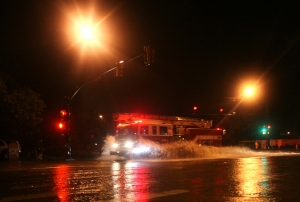
A Boulder Fire Deparment truck is fighting the floods at the intersection of 30th and Colorado on Sept. 11. Photo by Nate Brudzinski/CU Independent.
By Lars Gesing
In the aftermath of the recent historic Colorado floods, Boulder city officials and emergency departments are now evaluating the sufficiency of their response to the deluge.
“There are always people who think that we should have done more,” Mayor Matt Appelbaum said in a City Council meeting last week, “but for anybody who has been out and about, it has just been a remarkable effort for people working essentially around the clock.”
Boulder Police Chief Mark Beckner had his staff working 12-hour-shifts during the days of the flood, and 146 officers called in on Friday, Sept. 13. The chief pointed out that there were no reported injuries, missing people or fatalities within the city limits.
Still, not all of the operation went smoothly, Beckner said.
“By Thursday night (Sept. 12), we were no longer able to manage all the road closures. We had to let them go.”
Beckner’s department also suspended all responses to burglar alarms and minor incidents that evening.
When the waters kept rising, even police cars got stuck.
“We still had some high-rise SUV-type vehicles that were able to get through most of the time, but many of our patrol cars were grounded,” Beckner said, who the quickly confirmed that the department was addressing that particular problem by buying new vehicles, “which will give us the possibility to respond and move around not only in weather like we experienced but also in a snowstorm.”
Recommended budget includes additional funding for public safety
Before the heavy rainfalls started hitting Boulder, city officials had already emphasized their concern about public safety, distributing a fair portion of the recommended budget for 2014 on additional spending for the police and fire departments. According to the preliminary plan, the Boulder Police Department budget will amount to $32.04 million – an increase of roughly 1 percent compared to $31.75 million of approved funding in 2013. The Boulder Fire Department is even budgeted to receive a 5.6 percent raise for 2014 with a recommended $17.56 million in funding. City Council is currently debating the proposed funding tables.
In a press release, the city’s communication office pointed out that the recommended budget included funding for two new police officers and a new commander. It’s an initiative that is “part of the police department’s long-term plan to hire eight new officers and strengthen overall service and accountability to the public.”
City Council member Macon Cowles said funding for emergency crews likely can’t be reassessed based on what authorities learned from the floods.
“We can’t afford emergency resources on a daily basis that would allow us to fully respond to a flood that was maybe a once-in-500-years event,” Cowles said in an interview.
Boulder Fire Chief Larry Donner supports Cowles’ stance.
“You can plan, but you plan around the resources you have available. If we tried to staff for a 500-year-flood, there would be a rebellion within the community, because you simply cannot afford staffing for the worst possible scenario,” Donner said during the City Council meeting. “We tried to work together with other response units to maximize the resources we had available during that time.”
How much communication is good communication?
In the days following the flood, not only City Council members, but other Boulder residents expressed concern about the quality of emergency crews’ communication with the public during the disaster. CU Boulder’s student publication, the CU Independent, recently quoted peers like 19-year-old economics major Israel Kalombo: “The information released to students was sub-par, just basic information.”
In a phone interview, Malinda Miller-Huey, assistant director of CU Boulder’s Office of Media Relations, answered the accusations in the CUI report.
“It is surprising,” Miller-Huey said. “We heard very different things. We received a lot of positive feedback about processing information in a frequent and timely manner.”
City Communication Director Patrick von Keyserling said during last week’s City Council meeting that his department had to make sure it shared only official and confirmed information, but had been trying to get word out by keeping social media feeds updated and posting the latest developments on the city’s official website.
Brian Harris, 28, an Assistant Manager at Rocky Mountain Anglers on Arapahoe Avenue, was happy with the flow of information.
“Minor miscommunications are normal during a chaotic event like this,” Harris said. “I regularly Googled ‘Boulder flood’ and the first thing that came up was the alert service. I thought that one was very accurate and up-to-date. I also signed up for the city’s emergency alerts. I only learned Thursday morning (Sept. 12) before I went to the store through one of those alerts sent on my phone that there even was a real threat of flooding.”